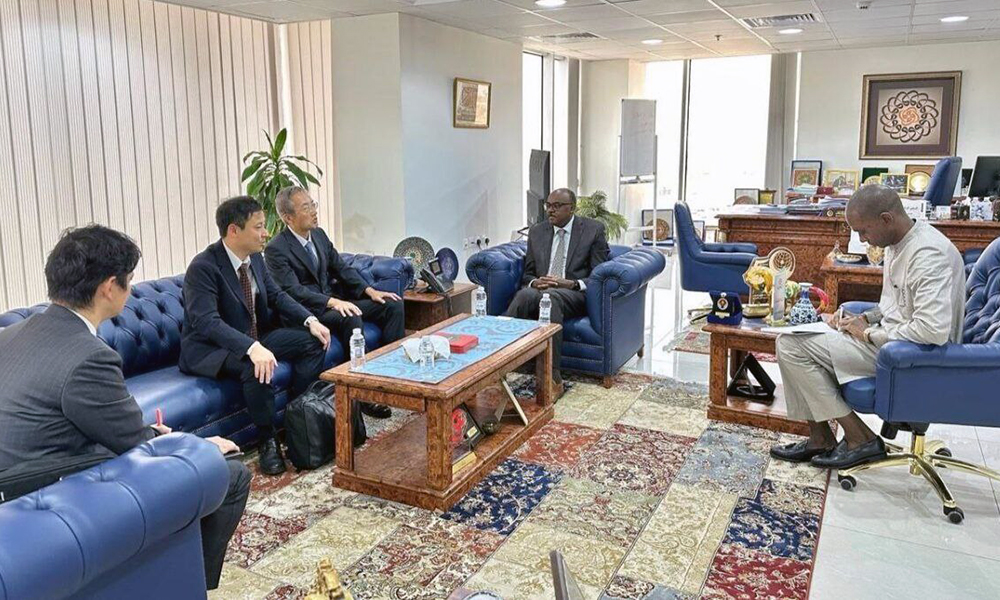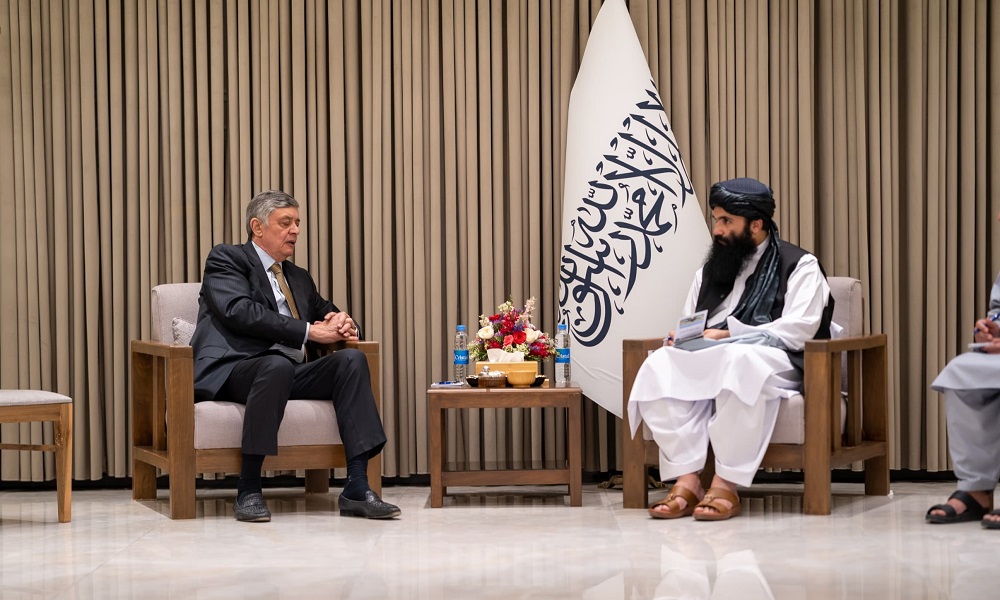Latest News
Japan, UNDP launch new community resilience programme in Afghanistan
Since 2021, UNDP’s efforts to develop alternative livelihoods in Afghanistan, in collaboration with multiple development partners and UN agencies, have benefitted over 100,000 farmers including around 22,000 women farmers nationwide.

The Government of Japan and the United Nations Development Programme (UNDP) have initiated a new one-year programme to support alternative livelihood pathways for rural communities facing critical challenges in Balkh and Uruzgan provinces.
Promoting Alternative Livelihood Pathways in Afghanistan (PALPA) focuses on strengthening opportunities, particularly for women and youth, with an aim to improve food security and build resilience to climate-induced shocks.
Since 2021, UNDP’s efforts to develop alternative livelihoods in Afghanistan, in collaboration with multiple development partners and UN agencies, have benefitted over 100,000 farmers including around 22,000 women farmers nationwide. Building on this progress, the PALPA, supported by a generous $6 million contribution from the Government of Japan, aims to generate sustainable employment and income opportunities for 50,000 vulnerable individuals, particularly those affected by the poppy ban and climate-induced disasters.
The programme is based on a women-centred approach, enhancing agricultural productivity, promoting diversified livelihoods, strengthening market linkages, and improving water management systems for ecosystem restoration. This highlights the vital role of women in driving national economic growth while also actively engaging men, which is essential in the context of significant unemployment.
An inclusive and participatory approach will guide the implementation, ensuring that interventions reach the most vulnerable, including internally displaced persons (IDPs) and returnees. Beneficiaries will be selected based on comprehensive vulnerability criteria developed in consultation with local communities and relevant stakeholders. This method ensures that the interventions effectively address the pressing needs of those most affected by the ongoing challenges in Afghanistan, including economic instability, climate change, and the impacts of the poppy cultivation ban.
“Japan is a longstanding partner in UNDP’s global mission to end extreme poverty, reduce inequality, and catalyse structural transformations that build resilience against crises and shocks. This specific contribution will enable us to reinforce our collaborative efforts to meet the basic human needs of 50,000 vulnerable Afghan people, especially women and girls. It allows UNDP to leverage its local expertise to develop alternative livelihoods and achieve systemic progress. In addition, this programme will also develop vital community resilience in the face of escalating climate change impacts, which present a significant obstacle to sustained progress. We are profoundly grateful to the Government and People of Japan for their ongoing commitment.” said Stephen Rodriques, UNDP Resident Representative in Afghanistan.
“We are pleased to supplement Japan’s existing support to Afghanistan with an additional $27.5 million in assistance for the Afghan people, of which $6 million is provided to our trusted partner, UNDP. This allocation includes targeted support for programmes that empower women, reflecting our commitment to promoting gender equality as a fundamental aspect of equitable and resilient growth. Since August 2021, Japan’s cumulative contribution to Afghanistan has now surpassed $505 million, underscoring our commitment to addressing basic human needs and supporting Afghanistan’s path towards sustainable economic and social development. I wish UNDP and our PALPA initiative every success in bringing about the systemic changes that are much required,” said KUROMIYA Takayoshi, ambassador of Japan to Afghanistan.
To maximize its impact, the PALPA is designed to complement and create synergies with other ongoing interventions in Afghanistan. By identifying gaps and aligning with existing efforts, the programme aims to provide a better-coordinated response to the immediate needs of rural communities. UNDP will collaborate closely with national and international networks, including the Counter Narcotics Working Group for Afghanistan, and leverage collective expertise.
Latest News
Tarig Ali Bakheet and Japan’s Deputy Foreign Minister discuss Afghanistan’s situation
Both sides emphasized the importance of continued collaboration to address the urgent needs of the Afghan people.

Tarig Ali Bakheet, the Special Representative of the Organization of Islamic Cooperation (OIC) for Afghanistan, met and held discussions with a Japanese delegation led by Masayuki Kamada, Deputy Minister for Foreign Affairs of Japan, regarding the situation in Afghanistan.
According to a statement by the OIC, the meeting mainly focused on the current situation in Afghanistan and explored ways to enhance humanitarian cooperation between the organization and Japan.
Based on the statement, both sides emphasized the importance of continued collaboration to address the urgent needs of the Afghan people.
The meeting took place at the office of the OIC Special Representative for Afghanistan in Jeddah, Saudi Arabia.
The statement also noted that the Consul General and Deputy Consul General of Japan in Jeddah were part of the Japanese delegation.
Latest News
AWCC activates new site in Nangarhar’s Kuz Kunar district
Residents of Kuz Kunar expressed happiness over gaining access to telecom and internet services and called for the further expansion of such services across Nangarhar.

Officials from Afghan Wireless Communications Company (AWCC) say they have activated a new site in the Kuz Kunar district of Nangarhar province.
According to AWCC representatives, the launch of this site has provided thousands of families with access to telecommunication and internet services.
They added that Afghan Wireless will also soon launch 4G internet services in the area.
Meanwhile, officials from Nangarhar’s Department of Telecommunications and Information Technology stated that efforts are underway to expand telecom services to other remote areas of this province.
Rahimullah Shinwari, head of the ATRA (Afghanistan Telecom Regulatory Authority) office in Nangarhar, said that with the activation of the new AWCC site, 25,000 families will now have access to telecom and internet services.
Residents of Kuz Kunar expressed happiness over gaining access to telecom and internet services and called for the further expansion of such services across Nangarhar.
In recent years, AWCC has extended its telecom and internet services to many remote areas across the country.
Latest News
Moscow’s move a ‘significant step toward recognizing Afghanistan’s political realities’, says Haqqani

Acting Minister of Interior Sirajuddin Haqqani on Wednesday met with Zamir Kabulov, Russia’s special envoy for Afghanistan, and Dmitry Zhirnov, Russia’s ambassador to Kabul.
Haqqani expressed appreciation for Moscow’s recent decision to remove the Islamic Emirate from its list of terrorist organizations. He described the move as “a significant step toward recognizing the political realities of Afghanistan.”
In a statement, the interior ministry said that both sides emphasized the importance of upgrading diplomatic relations to the level of embassies and reaffirmed their commitment to mutual cooperation in the fields of security and trade.
During the meeting, the two parties also discussed regional and bilateral cooperation in the areas of security, economy, and commerce, and stressed the need to strengthen ties between the two countries.
-

 World4 days ago
World4 days agoThousands of protesters rally against Trump across US
-

 World5 days ago
World5 days agoIran, US end nuclear talks in Rome, agree to meet next week
-

 Latest News4 days ago
Latest News4 days agoPolio vaccination campaign launched in Afghanistan
-

 International Sports4 days ago
International Sports4 days agoIPL 2025: 14-year-old Vaibhav Suryavanshi becomes youngest IPL player
-

 International Sports2 days ago
International Sports2 days agoIPL 2025: Robo-Dog ‘Champak’ explained
-

 Latest News3 days ago
Latest News3 days agoChina invites various Afghan delegations to attend Shanghai forums
-

 Latest News3 days ago
Latest News3 days agoAriana Afghan Airlines increases flights to China
-

 World3 days ago
World3 days agoPentagon chief Hegseth shared sensitive Yemen war plans in second Signal chat, source says
























